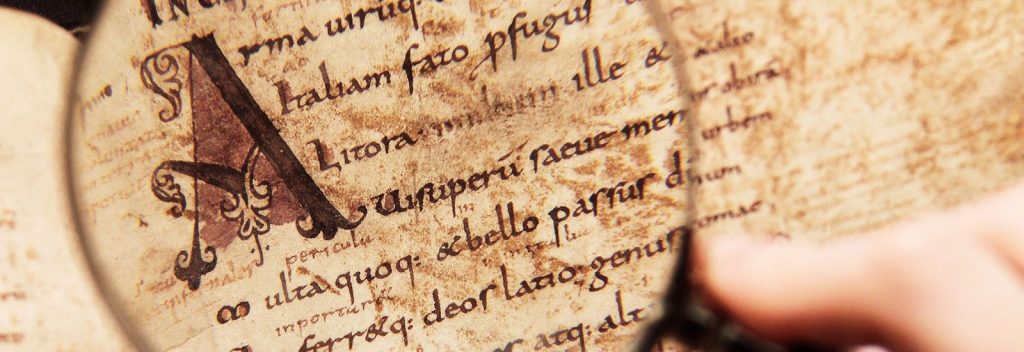
Ancient Letter Collections Project (and how you can help!)
Professor Andrew Morrison is Professor of Greek at The University of Manchester, and is co-director of The Manchester Centre for Correspondence Studies, which was awarded a JRRI collaboration grant in 2019/20. The MCCS developed out of the Manchester Lives and Afterlives of Letters Network, and brings together scholars working on different types of correspondence from across different periods and disciplines. Find out more by visiting their blog.
One of the ongoing research projects that members of the Manchester Centre for Correspondence Studies are engaged on is the AHRC-funded Ancient Letter Collections Project. Two MCCS members, Andrew Morrison and Antonia Sarri, work on the Project, which is also closely associated with the John Rylands Library and John Rylands Research Institute, since a copy of one of the key texts in the history of the publication of ancient letters is held in the Special Collections – the 1499 Aldine edition of the Greek epistolographers (a workshop on the Aldine was held at the Rylands in 2019).
The letter collections of Greco-Roman antiquity dwarf in total size all of ancient drama or ancient epic put together. Some of the most famous figures of classical antiquity have letter collections which have survived (or which are at least attributed to them): Socrates, Plato, Aristotle, Hippocrates, Euripides, Demosthenes, Cicero, Pliny. However, they have commanded nothing like the attention of ancient Greek and Latin epic or drama. The Ancient Letter Collections project aims to establish the study of ancient letter collections as a discrete and unified field, by determining for the first time how many such collections survive, and through a detailed examination of each collection which survives in Greek or Latin from the fourth century B.C. to the fifth century A.D.
One of our central aims is to establish how ancient letter collections were arranged and read. A good number of surviving ancient letter collections are available only in standard modern editions which have abandoned the distinctive ordering that is found in the medieval manuscripts. By investigating how each letter collection that survived from antiquity was arranged in the manuscripts, we aim to recover and highlight distinctively ancient reading practices in relation to letter collections.
The project will produce two books: (i) a critical review of all the surviving (Greek and Latin) letter collections up to about A.D. 410 and (ii) a synchronic monograph surveying the collections from a number of different perspectives. We have identified just over 50 letter collections for inclusion. The project is moving into the final phase of work on the critical review and is producing draft entries of about 4,000-6,000 words on each of the letter collections: we are now seeking feedback on these entries. We would like to ask for your help on the format and content of the entries.
Each entry includes a detailed review of the following relevant categories:
1. Modern Reference Edition
2. Senders
3. Extent and Range of length
4. Dating
5. Arrangement of Letters in Mss
6. Publication History
7. Addressees and Summary of Contents
8. Characteristics of the Collection
9. Associations in Mss
10. Current Text-Critical and Editorial Work
11. Modern Critical Editions and Indicative Bibliography
Each entry contains some general information on the letter collection in question, but ultimately the emphasis falls on sections 5 and 8: how are the letters arranged in the manuscripts and what are the implications of these arrangements for ancient, medieval and modern readings of the letters? These questions are important because under two-thirds of standard editions for our c. 50 letter collections either do not (or cannot) reflect the kinds of ordering and variant ordering visible in the manuscripts. The project as a whole is premised on the argument that the selection and ordering of letters determine the reception and interpretation of a given letter collection.
If you would like to give us feedback on the entries, some of which are available to download in draft form, please visit our page at: https://clahresearch.wordpress.com/ancient-letter-collections-project/






0 Comments